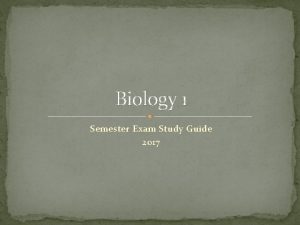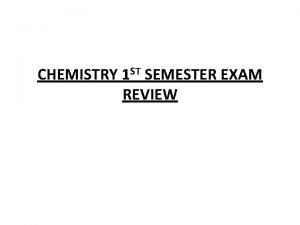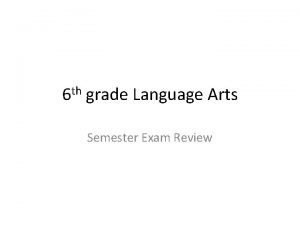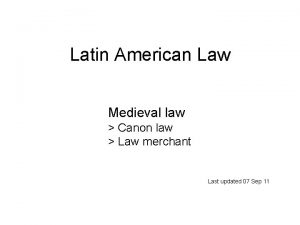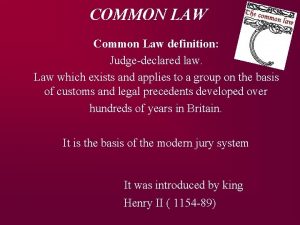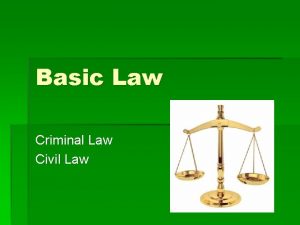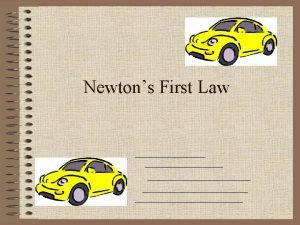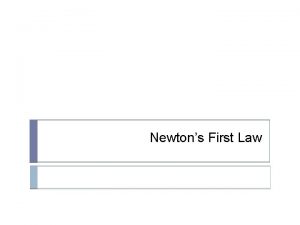English for Law First semester of 4 semester











![Definition of law Pronunciation: /lɔː/ noun 1 [mass noun] (often the law) the system Definition of law Pronunciation: /lɔː/ noun 1 [mass noun] (often the law) the system](https://slidetodoc.com/presentation_image_h/b539f1a39cd7c034af90c394782362ed/image-12.jpg)






- Slides: 18

English for Law First semester of 4 -semester course

Who are you studying with? • Introductory ice –breaker 1. Form groups of 3 2. Make guesses about your group members and jot them down 3. Compare your guesses with the reality

Your expectations - What do you expect to do in Legal English class and at home? - What do you expect to use English for while at the Faculty and later when you practice law? - What do you WANT to do and what langaugae skills do you feel you NEED to practice?

And what we are actually going to do in class… Information in Osnova https: //is. muni. cz/auth/el/1422/podzim 2014/MP 111 Z/index. qwarp Course requirements: credit for – attendance, active participation, compulsory written assignment + passing a credit test Credit test – translation of legal phrases (Czech – English, English-Czech, 3 definitions, 2 questions about course content example: in the IS (Osnova Revision)

Povinná: V osnově předmětu: https: //is. muni. cz/auth/el/1422/podzim 2014/MP 111 Z/index. qwarp Bring the materials to the lessons! - changes by email Doporučená: Chromá, Marta. Anglicko-český právnický slovník. English-Czech law dictionary. Leda, 1997. Chromá, Marta. Česko-anglický právnický slovník. Czech -English law dictionary. Leda, 2001. Chromá, Marta. New introduction to legal English. Revised Ed. Volume I. Univerzita Karlova, 2011. Chromá, Marta. New introduction to legal English. Revised Ed. Volume II. Univerzita Karlova, 2011. Powell, Richard. Law today. 1. ed. Harlow : Longman, 1993. Krois-Lindner, Amy – Firth, Matt. Introduction to International Legal English. CUP, 2008.

Legal Studies a) What might be the reasons or motivation for the undergraduates to have decided to study law? b) What are the usual objectives the law students want to achieve? c) What are the lawyers required and expected to be able to do? d) What will the law degree equip you for? e) What are the compulsory and optional subjects you have to study in the first year? Describe one of them. f) List some other subjects you are going to study at the Faculty of Law in Brno.

Listening: Should I go to law school? Yourself/ In your Recording opinion Why do I want to become a lawyer? I want to practice law. What are the benefits for any student? • intellectual stimulation • improving critical thinking • sharpening attention to detail No, otherwise the speaker would be an astronaut or a plumber. Is a law degree a ticket to any profession?

What is law? a) Give examples how our behavior is regulated by rules. - there are informal social rules, formal rules of institutions, laws created by the government b) What happens if somebody breaks a law? - he/she can be punished (civil action: compensation, criminal action: fine, prison, …) c) Give at least three reasons why we need law. - to resolve disputes, to ensure peaceful society, to respect human rights, to ensure equality, …

What is law Collocations • • • to break laws/duties to settle disputes to carry out duties to resolve disputes to respect rights/laws/duties

What is law Group work: Create your definition of law. people enforce power authority oppression reason morality control rules relations body society regulate system conduct customs govern

Definitions of law a) A body of rules fixed and enforced by a sovereign political authority. John Austin b) Law is a tool of oppression used by capitalists to control the proletariat. Marxist theory c) “An embodiment of Reason”, whether in the individual or the community. Plato d) Law is the formal glue that holds fundamentally disorganised societies together. Thomas Hobbes e) LAW: (1) a binding custom or practice of a community: a rule of conduct or action prescribed or formally recognized as binding or enforced by a controlling authority (2) the whole body of such customs, practices, or rules Merriam-Webster English Dictionary
![Definition of law Pronunciation lɔː noun 1 mass noun often the law the system Definition of law Pronunciation: /lɔː/ noun 1 [mass noun] (often the law) the system](https://slidetodoc.com/presentation_image_h/b539f1a39cd7c034af90c394782362ed/image-12.jpg)
Definition of law Pronunciation: /lɔː/ noun 1 [mass noun] (often the law) the system of rules which a particular country or community recognizes as regulating the actions of its members and which it may enforce by the imposition of penalties: shooting the birds is against the law they were taken to court for breaking the law [as modifier]: law enforcement [count noun] an individual rule as part of a system of law: a new law was passed to make divorce easier and simpler systems of law as a subject of study or as the basis of the legal profession: he was still practising law [as modifier]: a law firm, law students something regarded as having binding force or effect: he had supreme control—what he said was law (the law) informal the police: he’d never been in trouble with the law in his life 2 a rule defining correct procedure or behaviour in a sport: the laws of the game 3 a statement of fact, deduced from observation, to the effect that a particular natural or scientific phenomenon always occurs if certain conditions are present: the second law of thermodynamics

Language Practice Exercise 7. 1 Be careful about the Czech term “právo”. It is translated into English in two different ways depending on its nature: • “objektivní právo”, e. g. “právo této země” is LAW translated as “______” • “subjektivní právo”, e. g. “má právo volit” is RIGHT translated as “______”

Language Practice Exercise 7. 2 a) Law is a living and dynamic system. b) The right to life is a fundamental/basic human right. c) He has read the patient rights and responsibilities/duties. d) Law is enforceable and binding.

Language Practice • • lawful X unlawful lawfully X unlawfully law legal X illegal legally X illegally legal 1 relating to the law, required by the law 2 permitted by lawful conforming to, permitted by, or recognized by law

Legal Practice • Exercise 7. 4 legal a) He asked for ________ advice. unlawful/illegal b) Their activities were unethical and ________. unlawfully c) The man was ________ killed. illegally/unlawfully d) What makes people cross the border _________? e) There’s nothing wrong with my behaviour, it’s perfectly legal/lawful ________.

„law“ collocations • natural law, contract law, banking law, taxation law, company law, labour law, family law, welfare law, a new law • law theory, law schools, law department, law enforcement, a law firm • legal education, legal system, legal practitioners, legal profession • to make the law, to study law, to break the law, to pass the law, to practice law, to apply the law, to propose a new law

„law“ collocations • the law regulates, the law provides, the law applies to • the law of a community, the laws of the game, the laws of thermodynamics, the law of the country • philosophy of law, a system of law • within the law, by law, according to the law, to be against the law
 Newton's first law and second law and third law
Newton's first law and second law and third law Newton's first law and second law and third law
Newton's first law and second law and third law English 3 semester exam
English 3 semester exam Boyles law
Boyles law How to calculate boyle's law
How to calculate boyle's law The first semester exam grade 10
The first semester exam grade 10 Biology 1st semester exam study guide
Biology 1st semester exam study guide World history semester 2 review
World history semester 2 review Chemistry semester exam review
Chemistry semester exam review English 1 semester 2 exam
English 1 semester 2 exam English 12 semester 1 final exam
English 12 semester 1 final exam English 3 fall semester exam review
English 3 fall semester exam review English semester exam
English semester exam Uf law semester in practice
Uf law semester in practice Formuö
Formuö Typiska drag för en novell
Typiska drag för en novell Tack för att ni lyssnade bild
Tack för att ni lyssnade bild Returpilarna
Returpilarna Varför kallas perioden 1918-1939 för mellankrigstiden?
Varför kallas perioden 1918-1939 för mellankrigstiden?






